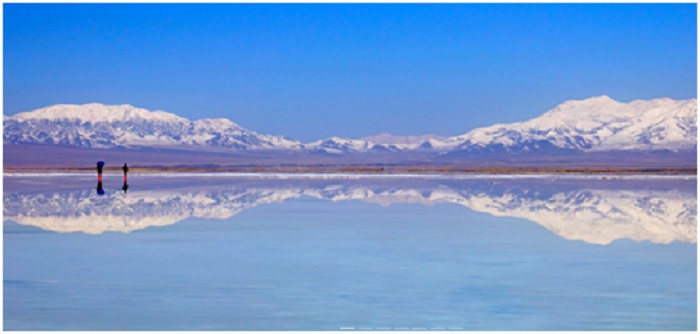



Driving westward along the Qinghai-Tibet Highway for two hours from Xining, capital city of northwest China’s Qinghai province, one can arrive at the Qinghai Lake, a famous tourist destination in Qinghai, which ripples and sparkles in the sun.
Amazed by the magnificent scenery of the Qinghai Lake, Wang Xuan, a tourist from east China’s Anhui province, couldn’t help but press the shutter release. “The Qinghai Lake is definitely worth visiting,” Wang said.
Due to climate change, human activities and other factors, the Qinghai Lake once suffered from serious ecological degradation, when biological resources declined sharply, the surrounding grasslands underwent desertification and degradation, water level fell continuously, and water area kept shrinking.
To tackle the problem, the local government set up a nature reserve at the Qinghai Lake, blockaded the lake for fish breeding, and incorporated the conservation of the lake into the construction of China’s nature reserve system centered around national parks.
After years of efforts, Qinghai Lake finally started to see improving ecology and yield increasing ecological and social benefits.
“I’m really happy that the Qinghai Lake I knew when I was little has finally come back,” said Li Chaowei, head of a criminal investigation and law enforcement police team in charge of husbandry-related cases in Gonghe county, Hainan Tibetan autonomous prefecture, where the Qinghai Lake is situated.
Li and three of his fellows are responsible for patrolling the 186-kilometer shoreline on the south bank of Qinghai Lake. “Less than three incidents of illegal fishing in the lake are now reported a year,” Li said, who noted that the amount of naked carp in the Qinghai Lake exceeded 100,000 tons by the end of last year, an increase of nearly 40 times from the beginning of the 21st century.
During this year’s May Day holiday in China, Qinghai Lake received 45,000 tourists, registering a tourism income of nearly 5.17 million yuan (about $798,633).
Farmers and herdsmen in Qinghai have become increasingly aware of the importance of ecological conservation, and understood more deeply that lucid waters and lush mountains are invaluable assets.
The clear Chaka Salt Lake, also a popular tourist attraction along the Qinghai-Tibet Highway, attracts hundreds of thousands of visitors every year. It looks like a fairyland against the blue sky and while clouds, and is known as the “mirror of the sky” in China.
Bayin village, which is located near the Chaka Salt Lake, has brought villagers a better life by boosting tourism.
To draw tourists, Bayin village has comprehensively improved its living environment and infrastructure. Now the village has flat and clean roads, spacious and lively squares, and bright and tidy hotel rooms.
“Decorating the garden can not only attract more visitors, but bring pleasure to myself,” said Shen Deping, a local villager, while planting flowers in a garden in front of her home.
Taking advantage of the Chaka Salt Lake, farmers and herdsmen in Bayin village, once a poor mountainous village, has started to run B&Bs, with the total number of hotel rooms in the village reaching 328. To provide better travel experience for tourists, Bayin has pooled resources to hold training courses on cooking, B&B management, and Mandarin.
Not only has Bayin village got a brand new look, but residents in the village have adopted a new mindset and shown great enthusiasm for making their hometown better.
“Whoever did a poor job in keeping their houses clean would be too embarrassed to make a speech at the villagers’ meetings,” said Shen, who has just been reelected as president of the women’s federation of the village.
“As villagers compete and cooperate with each other in improving tourism products and services, they have forged better neighborly relations,” Shen noted.
“We will continue to take the opportunity provided by the Chaka Salt Lake, push ahead with the unified management of B&Bs, and perfect the services to make local people more prosperous,” said Zhao Fuchang, an official stationed in Bayin for poverty alleviation.


The Executive and members of the.


The Acting Director, FCT Directorate of.


President Bola Ahmed Tinubu has been.



Barely a month after resignation of.


An Abuja based Legal Practitioner, Osuagwu.



Convener of Equitable Remedy, Mrs. Magaret.


Contractors handling the contract for city.


Nigerian government may have concluded plans.


The Diplomatic Correspondents Association of Nigeria.


A rights group, “Follow Me Talk.
Leave a Comment